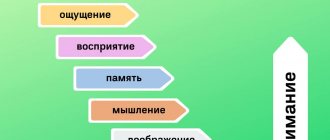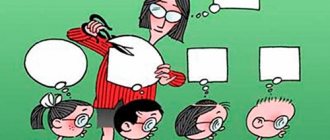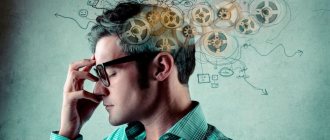A huge number of people live and work in “Groundhog Day”. Now they make money, but later they will turn into old people with progressive dementia. It's a shame, but what can you do? Nothing accelerates brain atrophy more than routine and a constant environment. It destroys the attention system, weakens memory, and disables the “pleasure center.”
The good news is that the brain is plastic and trainable. Elizabeth Gould and Bruce McEwan conducted several experiments with monkeys - scientists found that animals form new neural connections when they perform actions that are unusual for them. The women made a statement that the phenomenon being studied is also characteristic of humans. Mostly neurons are added to the medial surface of the temporal lobe, which is responsible for memory, naming, taste, smell, and sound synthesis. New neurons were also noticed in the prefrontal and inferior parietal zones: the first carries out complex control of mental and motor activity, the second forms articulatory actions.
Neurons are a small universe
As you can see, neurons are formed in areas that affect critical cognitive functions. These are the ones that need to be developed so as not to accidentally hand over your apartment to scammers when you are well over 90. It is important to develop a training program that will involve all functions at the same time or one by one.
I went through the blogs of psychotherapists, read books about brain plasticity, remembered several exercises from speed reading courses and compiled a selection of cognitive exercises. Do they work? We'll find out in old age. If you have already exercised and feel qualitative changes, write in the comments which ones.
Go!
Everyday exercises to develop cognitive abilities
These exercises can be done without interruption from the natural course of life, adding new, sometimes piquant conditions. They train terrain orientation, balance, all types of perception and, as a bonus, increase memory capacity.
- Designate a day of darkness: shower, eat, clean without light.
- Watch videos without images or with images but no sound.
- If there is a child, check his homework (+1000 stamina).
- Give each video you watch a title. Summarize the whole meaning in one word. Come up with names for the shops and establishments you walk near. Don't repeat yourself.
- Navigate around the city without a map, invent unfamiliar routes.
What is dementia
With the development of dementia, a person’s mental abilities decrease, existing knowledge and skills are gradually lost, and the ability to learn is lost.
Thinking, orientation, understanding, counting, learning, language and judgment are impaired. There are many reasons why dementia develops. Dementia can be triggered by endocrine and vascular pathologies, depression, certain infections, traumatic brain injuries, brain tumors, alcoholism and drug addiction. Additional risk factors for developing dementia include:
- heredity. Moreover, the risk increases if the pathology in close relatives developed before the age of 65 years;
- obesity;
- lack of active intellectual activity.
Balance and coordination exercises
Balance and coordination exercises improve blood flow to all parts of the brain. Accordingly, more oxygen enters the main organ, which stimulates cellular respiration and slows down the process of cell death.
- Stand up straight, arms extended with fingers spread. Connect them so that your fingers match. After a second, separate and place your hands on your shoulders (right to right, left to left). Connect your fingers again. Repeat the exercise 10–20 times at a fast pace and with a minimum of misses when connecting your fingers
Put your fingers together
- Sit down and stretch your legs crossed at the ankles so that your feet touch the floor. Slowly bend forward as you exhale. Extend your arms parallel to your legs. Return to the starting position while inhaling. Repeat 4-6 times.
- Lie down. Bend your lower leg and bring your upper arm to your bent elbow. Do the exercise slowly, being aware of every millimeter of movement.
- Stand straight but relaxed. Alternately tilt your head to the sides and touch your shoulders with your earlobes. Extend your hand forward and imagine that you are holding your index finger at the core of a flower with five petals. Follow the contours of the flower with the upper body.
- Remember what the peace and approx signs look like. Extend either hand and alternately show the signs made from your fingers. Practice for a minute. Then do the same with both hands and at a very fast pace. At the third stage, add sound: say the proverb “There is honey cake, but I have no time for honey cake”
When you achieve synchronization, perform the exercise so that each hand shows a different sign.
Do you want to get a sought-after Internet profession? Sign up for the SMM Specialist course from TexTerra.
Engage your sense of smell
Have you been using the same perfume for years? It's time to change that! A good way to get your brain working is to rid it of the “aromatic” routine. The sense of smell is an important channel for the perception of reality. You also need to periodically add something unusual to it, be it new perfumes or spices when cooking.
Biohacking: is it possible to hack your body and gain eternal youth?
Imagination exercises
Imagination distinguishes us from animals. This is what biologists say: seals deny this fact. Develop your imagination to be able to navigate different points of view, experience subconscious experiences, and think creatively.
- Imagine in your head how you play the piano. How are your fingers positioned? At what speed are they moving? What melody is being played - hear the sound, catch the rhythm, try to move to the beat. Think of a story - why this composition was born, what feelings it is associated with. Do the exercise in silence.
- Print out several copies. On each one, complete the picture in accordance with the random theme that arose in your head (animals, body parts, accessories, etc.).
I mentally drew the girl. And you?
- Name associations with the numbers 12, 7, 4, 56, 11. When these numbers run out, come up with new ones and repeat the exercise.
- Look at the picture. Imagine the music with which she is associated. Write down a story that, in terms of dynamics (cheerful, cheerful, sad, etc.) repeats the composition in your head.
Radcliffe as a corpse in The Swiss Army Knife
- Think about the last movie you watched. Transfer the script to another era: how will the plot be transformed, will the characters’ characters change, will the ending be the same?
THAT for the brain. When to start?
When does the brain begin to age? How to maintain productive mental activity and brain health into old age? Is it really possible to “train” the brain?
Some facts
There is evidence that the loss of a certain part of the brain tissue occurs after the age of 20. After 60, the speed of this process increases. However, in many cases we do not notice these changes - especially at a young age. And in older people, cognitive impairment is also not always observed.
LOSS OF A CERTAIN PART OF BRAIN TISSUE OCCURS AFTER THE AGE OF 20
Among other things, this can be explained by the fact that the number of cells in the brain is built up with a “reserve”, so that age-related losses should theoretically have no effect on either memory or intelligence.
Read the material on the topic: How did Albert Einstein's brain work?
But why then does this happen?
"Tell me who your friend is and I'll tell you who you are"
What affects brain performance? Our lifestyle plays an important role in the health of our biocomputer.
Dietary patterns with excessive consumption of fatty foods, prolonged stress, suboptimal daily routine, work and rest (in particular, lack of sleep) contribute to the development of atherosclerosis. What happens with this disease? Plaques that form in the vessels of the brain (and not only) lead to a decrease in the flow of blood into it. As a result, the capabilities of the intellect, memory, activity, and ability to orientate change.
Factors such as polluted air and water, chronic illnesses, smoking, and consumption of alcoholic beverages and drugs also negatively affect the brain.
Alzheimer's and Parkinson's diseases play an important role in the dysfunction of the brain and the deterioration of its abilities.
Read material on the topic: And the president is powerless before her... Alzheimer's disease of Ronald Reagan
A comfortable chair and physical inactivity, tasty but useless (or even harmful) food, a feverish need to achieve success at any cost (“Definitely, vanity is my favorite sin” - remember Al-Pacino’s character from “The Devil’s Advocate”?) - “ “friends,” these are, frankly speaking, false. But if you know them by sight, you can do something, right? What else can help?
What is used develops
To develop and maintain our muscles in good shape, we engage in physical exercise. In general, this principle applies to the brain: progress occurs when it is trained.
The reader may argue that his head is constantly working: news, analysis of what he sees and hears. But we also go regularly - for example, to a store 5 minutes from home. Does this make our body stronger and our heart healthier? It is unlikely to be so noticeable - most likely they remain in their previous form. In addition, over time, age-related changes begin to have an effect.
An approximate analogy can be drawn with the brain. When does it actually develop? Since our birth. School and university are stages of life’s journey when high demands are placed on it. He cannot help but answer and... becomes different. What happens next? And then we largely use what we have learned. But this is the case when regular learning new things no longer occurs.
Read material on the topic: Bill Gates and his brain
So what is good for our brain? How to maintain and develop memory, thinking, attention? If exercise is for muscles, why shouldn't it be for our supercomputer? And this is actually true.
Analyze your work and home habits. And then learn a skill that you don’t have.
STUDYING A FOREIGN LANGUAGE IS ONE OF THE MOST USEFUL EXERCISES FOR DEVELOPING YOUR BRAIN
When was the last time you used a foreign language? For communication, reading, watching movies? For a long time? Return to a foreign language and, if possible, never part with it again. If you achieve success in one language, move on to another, from the same or a completely different language group. English, Chinese and Arabic will make your brain function differently, even though they are all languages.
Do you know how to play a musical instrument? Maybe you dreamed? Start making your dream come true.
In addition to playing the violin, the famous Mr. Sherlock Holmes played excellent chess. Do you like this game too? Or do you prefer the East with its Go? Crosswords and puzzles can also keep your brain active.
Do you like poetry? What about reciting by heart? If you also speak a foreign language, then “To be, or not to be: that is the question” might also be something you can do? Try it!
Read books. Don't know what to read? Look for recommendations online.
"Life is motion"
Probably everyone knows this phrase in different versions. Physical activity not only speeds up blood flow in general and in the brain in particular. Physical exercises are used in the rehabilitation of patients whose motor sphere suffers.
You may be surprised, but a specially designed motor program can literally change the functioning of the brain. Yes, that’s right: not only the brain provides you with the ability to move, but the movement itself “backwards”, from the periphery, affects it and its functions.
A SPECIALLY DESIGNED MOTOR PROGRAM IS CAPABLE OF LITERALLY CHANGING THE FUNCTIONING OF THE BRAIN
An active lifestyle also has a beneficial effect on the emotional component: movements calm you down and increase your resistance to stress (but we remember that what matters is not what affects us, but how we feel about it). So the movement is on our side: perhaps it is thanks to it that we will be able to ignore everyday interruptions and be more calm about daily events.
It is important to remember about the right choice of physical activity. So-called aerobic exercise (for example, long walks) is beneficial for the brain. But strength training requires increased accuracy: being exhausting and frequent, it will not bring any benefit. Therefore, in order to choose the option that is right for you, consult with a specialist in physical therapy and sports medicine: among other things, some pathologies may have contraindications for a number of sports and physical activity.
Read the material on the topic: What medical examination must be completed before starting exercise in the gym?
Travel. It doesn't have to be far. Change your environment, including nature. Get out of the city, away from the bustle. Look for sources of positive experiences.
Do you take a certain route to work? Change it. The brain will have to “build” a new map: your spatial memory will thank you.
Unusual advice. Do you brush your teeth with your right hand? If yes, try left. Experiment with other, safer moments.
It's time. What about rest?
The common idea that you can relax by switching from one activity to another is, of course, true. How long have you been reading? Take a walk. But no one has canceled the importance of proper sleep. And if earlier, after a sleepless night, you could quite successfully finish the next school day, then after forty, a full-fledged sleep is an absolute necessity (and normally, always: for this you should not wait until your fortieth birthday).
Read the material on the topic: How much sleep does an adult need?
When you take a break from work, don't do anything that might stimulate your brain. Do not read or listen to material that requires attention. Switching to a similar activity is also not an option. It's better to take a nap or take a walk.
When work is joy
It’s not an easy question, but you need to strive for it. Often a person chooses between “should” and “want”. Don't give up trying to combine these things. Enjoying the process of what you do has its own beneficial effect.
Feed your brain correctly
Yes exactly. Include fish, vegetables and fruits, and cereals in your diet (of course, taking into account food allergies).
Read the material on the topic: Rules for healthy eating. What should you eat to stay healthy?
Get started today
Time only moves in one direction. Therefore, it is better to start something that will benefit you sooner rather than later - it is not at all necessary to wait until retirement (which, according to the latest “optimization” of legislation, will occur for residents of our country at a later age).
Be active, diversify your life, eat right and consult a doctor promptly if problems arise. This will keep your brain functioning well throughout your life.
Text: Enver Aliyev
Other
Exercise to develop taste and olfactory perception
Exercises involve the lower part of the parietal lobe, and also affect the limbic system, which regulates emotions and memory. So in the process of doing it you will get not only new neurons, but also a good mood.
- Come up with and prepare a dish that contains the maximum number of ingredients and which you have not tried.
- Order an unknown dish in a cafe and guess the ingredients: first by the smell, then by the taste. If you like liquid states, order a cocktail and repeat the procedure.
- Go outside and smell objects that you have seen but not smelled: a fence, a sign in a cafe, a kettle in the office. Relate in your head the smells of inanimate nature with already familiar smells of any nature. Then smell the plants, animals, birds. Do this if you are not allergic and you are confident that it is safe to interact with wildlife.
- Give as many definitions of the smells of common things as possible: onions - bitter, pungent, disgusting, etc.
- Compare the smells of objects from the same species group: perfume with perfume, herbs with herbs, cats with cats. How are they different? Find a large number of differences.
First signs of dementia
- Both long-term and short-term memory are impaired. It becomes difficult for a person to remember events that happened recently or remember new information.
- A person loses the skills of orientation in space and time. It is not uncommon for patients to become lost even in areas familiar to them.
- Indifference to once-loved activities appears, and the desire to learn new things disappears. This happens because the brain is no longer able to receive and process information.
- Reducing the criticality of one's own perception. Usually this symptom appears when planning the next period of life.
- In the future, both the progression of these symptoms and the appearance of others, more powerful in their effects, are noted. One of the clear hallmarks of dementia is that a person lives in his past.
At the earliest manifestations of the disease, it is important to promptly consult a therapist or general practitioner. If necessary, he will refer the patient to a specialist (neurologist, psychiatrist or geriatrician).
Listening exercises
The nuclei of the eighth nerve, located on the border of the medulla oblongata and the pons, are responsible for auditory information. They receive information from the right and left ears, after which it is compared and processed. The main work of deciphering sound occurs in the cerebral cortex. Exercises will help develop reaction speed and will also prevent age-related deafness.
- Work in pairs. Let the interlocutor read the text in a quiet, monotonous voice at a distance of 3–4 meters from you. He should stop every three minutes: during this time, retell the essence of what you read.
- The interlocutor at the same distance pronounces words in reverse. Your task is to hear and name correctly. Next, practice with long phrases and paragraphs.
- The interlocutor reads the poem with expression and changes intonation in the right places. Repeat exactly. The poem can be read from a page - the main thing is intonation.
- Group exercise: isolate yourself from your friends with a screen. Each of them must walk back and forth. After the end of the fashion show, guess which steps belonged to whom.
- Watch videos of foreigners and memorize their manner of speaking, intonation and other sound features characteristic of the nation.
I specifically do not give exercises for visual perception, since it is best to choose them to your taste. There are hundreds of apps for this. For example, CogniFit with the ability to take neuropsychological tests and personal training.
Observing beauty
Observing the beauty of nature, artistic paintings or other works of art stimulates the creativity in each of us and allows us to expand the capabilities of our intellect, switches the brain into a state of recovery.
Observing natural beauty, animals, plants, and natural phenomena is extremely useful for our self-development. Natural landscapes and beauty give us rich food for imagination. In the human world it is difficult to find such complex, rich, diverse and amazing creations as nature provides us with.
Observing natural beauties, every time we get new impressions, discover new objects and phenomena. All this constantly creates new neural connections, while relaxing our focus and therefore allowing our brain to rest.
Remembering beauty, we use memory. By visiting new places or observing strange creatures, we create thousands of new neural connections and expand our understanding of the world. And all this is in addition to the peace, tranquility and pleasure that we get from nature.
Observing the beauty of both nature and human creations is extremely necessary for all people: not only creative ones, but also other professions that seem far from creativity: in the field of technology, physics, mathematics and other fields. It is in these areas that new approaches and innovative solutions and creativity are often lacking.
How to relax your brain by observing beauty
1. The best place for intellectual relaxation is natural beauty . Mountains, fields, forests, rivers. Whenever possible, try to simply look at nature: large objects (lakes, trees, rivers, fields), pay attention to the small world (how bugs and snails crawl, what patterns are on leaves and snowflakes), raise your eyes up and look at the clouds, stars in the sky .
2. If possible, periodically visit exhibitions of artists, sculptors, photographers: look at works of art for aesthetic pleasure. Don’t try to strain too hard to understand the meaning, just look at how the artist painted, what colors are in the picture.
3. Find natural objects to observe in everyday life: a cat washing itself, flowers on the balcony, a tree outside the window, birds on the branches: all this contributes to your relaxation.
4. Find a collection or ask for a gift book with reproductions of your favorite artists. And scroll through it periodically, enjoying the process.
Advice
My family and I play the board game “Baramelka”. It develops reaction speed and logical thinking. The principle of the game is to grab the item named by the leader before the other participant. True, there is a serious catch, which you will learn about in the process. I'll keep the intrigue. I recommend the game to adults and children; it’s an excellent simulator for training cognitive functions.
Try to guess the rules: this also develops imagination
Walk more and breathe fresh air
Walking in parks is the best way to relieve stress and calm the nervous system. The singing of birds, the rustling of leaves on the trees, the crunching of branches underfoot have a magical effect on the human body. At this moment you want to be in the clouds and dream about something. Give yourself proper rest often.
The modern world has become very dynamic, the speed of human life has increased. It is not surprising that people have no time for relaxation and contemplation. If you also don’t have time to rest and are often stressed, then watch the free online course “Stress Management”. From the course you will learn useful relaxation techniques that can quickly relax during time pressure and restore internal balance.
We have become smarter
In 1984, scientist James Flynn found that the average IQ was rising gradually—by about three points every decade. He studied IQ test scores from the early 20th century and found that the 1920s average would be considered mental retardation today, while today's run-of-the-mill scores in the early 20th century would be close to genius levels.
Flynn is confident that people have really become wiser thanks to the fact that they began to eat well from childhood and suffer less from disease. In addition, the level of school education has increased, and access to information has become easier.
The Flynn effect demonstrates that humanity as a whole is getting smarter, and the power of intelligence depends not only on DNA.











